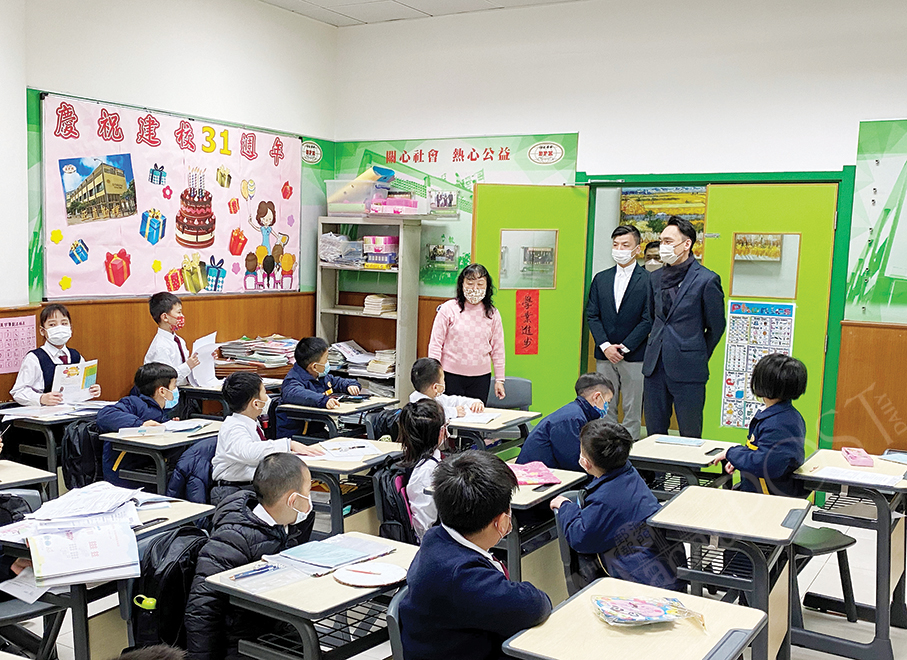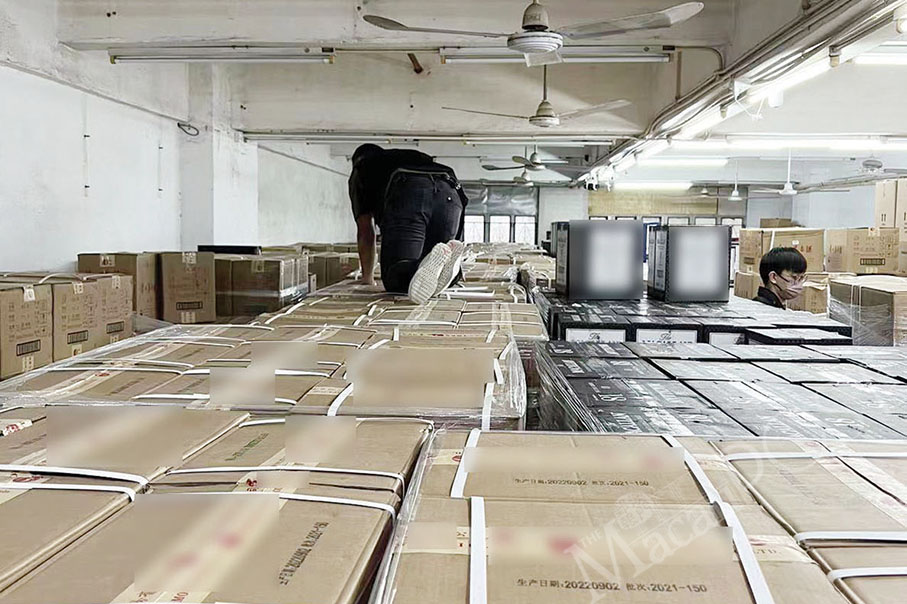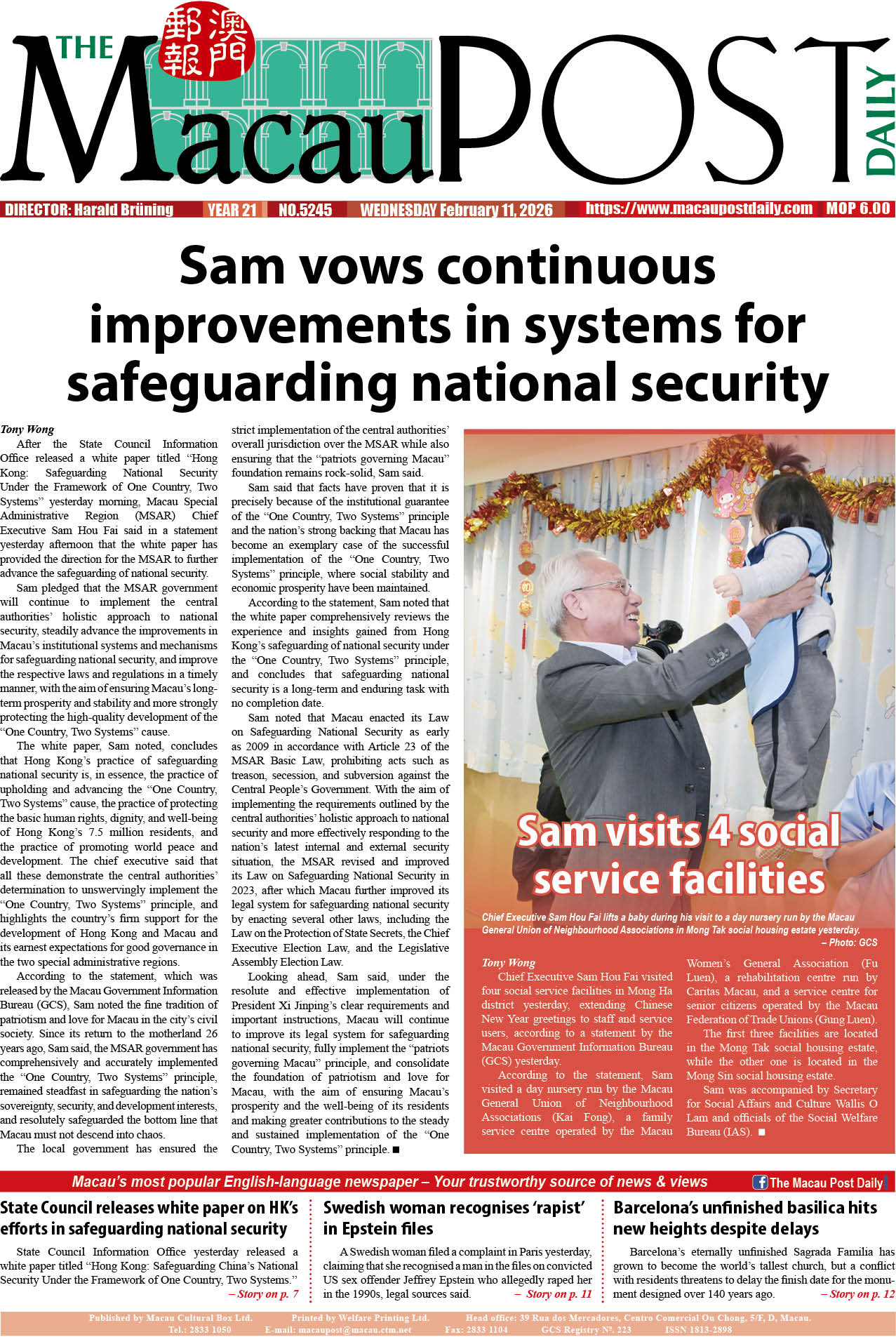The Macau government has strengthened its COVID-19 testing measures for those arriving from certain areas in the mainland, in response to the post-Chinese New Year (CNY) COVID-19 threat.
Leong Iek Hou, who heads the Communicable Disease Prevention and Control Division of the Health Bureau (SSM), announced the measures during yesterday’s regular press conference by the Novel Coronavirus Response and Coordination Centre.
In general, travellers from the mainland do not need to quarantine upon their arrival in Macau but are required to present a nucleic acid test (NAT) confirming a negative COVID-19 result, except those arriving from areas in the mainland that are affected by local COVID-19 cases are required to undergo hotel quarantine upon their arrival here.
Those arriving in Macau from any areas other than the mainland – namely the Chinese regions of Hong Kong and Taiwan as well as foreign countries – must undergo hotel quarantine upon their arrival here.
According to Leong, all those arriving in Macau via the local airport – i.e., those flying to Macau from the mainland who do not need to quarantine – have always had to undergo a nucleic acid test upon their arrival – despite holding an NAT certificate indicating a negative COVID-19 result.
Leong said that in addition to the local government’s measure requiring all arrivals at the local airport to undergo a nucleic acid test, from now all those entering Macau via all other checkpoints – namely land border checkpoints with Zhuhai and ferry terminals that run ferry routes from Wanzai in Zhuhai and Shenzhen – must also undergo a nucleic acid test at the respective checkpoints upon their arrival here, if they have visited the Guangxi Zhuang Autonomous Region, Heilongjiang province, the Xinjiang Uygur Autonomous Region, Beijing, Tianjin or Shenzhen within the past 21 days.
According to Leong, the respective travellers will not need to stay at the checkpoints to wait for their NAT results.
Leong said that the local government has decided to roll out the strengthened testing measures with the aim of preventing the post-Chinese New Year occurrence of new local COVID-19 cases in Macau, in the wake of the current novel coronavirus wave in Hong Kong and in various provinces, autonomous regions and municipalities in the mainland.
Leong said that the new testing measure aims to strengthen the local government’s COVID-19 prevention and control work for “those visiting or returning to Macau after the Chinese New Year holiday period.
Leong also again urged those who have visited Shenzhen or other areas in the mainland outside Guangdong to book a follow-up COVID-19 test, which should be taken four to seven days after their previous test.
Leong also underlined that a high percentage of people infected with the Omicron variant, which is widely spreading across the world, are asymptomatic or just come down with mild symptoms, because of which, she said, those who have come down with symptoms such as fever, headache, fatigue, cough, sore throat, nasal congestion, runny nose, and reduced sense of taste or smell, should see a doctor and undergo a COVID-19 nucleic acid test as soon as possible.
Leong also urged public entities, local companies and other organisations to strictly stick to the Health Bureau’s guidelines for their employees. Leong said that according to the guidelines, officially known as Recommendations for Organisations on Management of Workers, employers or managers should have a good understanding of their staff members’ travel history and contact history, and constantly monitor their state of health.
‘Too late’ to receive booster jab if Macau is hit by local cases
Meanwhile, Leong also said that around 240,000 people in Macau are currently eligible to receive a COVID-19 booster jab, but only around one third of them, or around 79,000, have already received it.
Leong said that some residents in Macau mistakenly think that there is no urgent need to receive a booster dose as the city is currently not hit by local COVID-19 cases. Leong urged residents to understand that Macau is subject to the possible occurrence of new local COVID-19 cases due to the ongoing pandemic globally.
Leong said that it would be “too late” if residents only receive a booster jab after Macau is hit by new local COVID-19 cases because of two reasons. Firstly, Leong said, people will only develop immunity at least 14 days after receiving the jab. Secondly, the government would need to suspend its COVID-19 vaccination programme if Macau is hit by new local COVID-19 cases, because in this case health workers would need to intensively engage in the city’s fight against the novel coronavirus, such as a citywide testing drive and epidemiological investigations.
Leong said that the government will send an SMS reminding eligible individuals to receive their COVID-19 booster jab.
Macau’s COVID-19 booster vaccination programme covers all those aged 18 or over who have been fully (twice) inoculated with COVID-19 inactivated vaccines or mRNA vaccines at least six months ago.
Both types of COVID-19 vaccines currently available in Macau, China’s Sinopharm inactivated vaccine and Germany’s BioNTech mRNA vaccine, are two-dose vaccines.
Leong also warned that experiences from various areas globally indicate that if the highly contagious Omicron variant entered the community in Macau, the city would be hard hit by a large number of new COVID-19 cases within a short period of time, in which case, she said, unjabbed senior citizens and those with chronic diseases who become infected with COVID-19 would run a “very high” risk of suffering a serious condition or even dying from the novel coronavirus disease. Such a scenario would also put a heavy burden on Macau’s medical system, Leong said.
Meanwhile, Leong also noted that the Public Administration and Civil Service Bureau (SAFP) released a set of guidelines around the middle of last month urging public servants to stay in Macau during the Chinese New Year period. According to the guidelines, Leong said, public servants who need to travel to the mainland should avoid visiting all other areas outside Guangdong or any areas in Guangdong that are affected by COVID-19. Leong said she believed that “most of” the public servants have complied with the guidelines.
Leong said that the Public Administration and Civil Service Bureau will ask all public entities to provide their respective data about how many of their staff members travelled outside of Macau during the CNY period.

Education and Youth Development Bureau (DSEDJ) officials check COVID-19 prevention measures taken in a school classroom earlier this week. Macau’s schoolchildren were back to classes early this week after the Chinese New Year holiday period. Photo: DSEDJ









